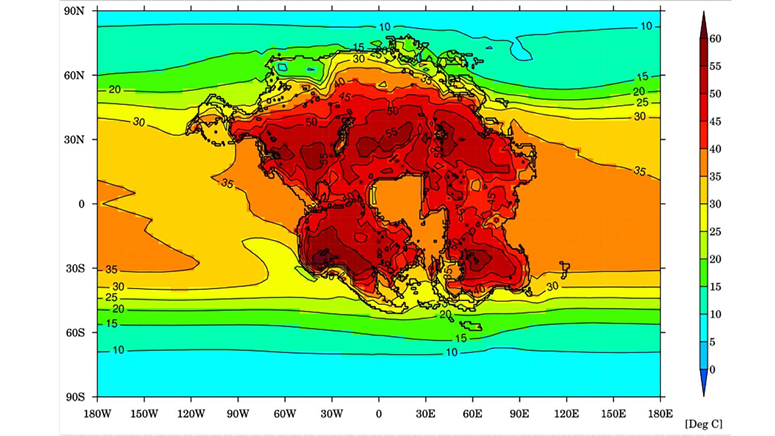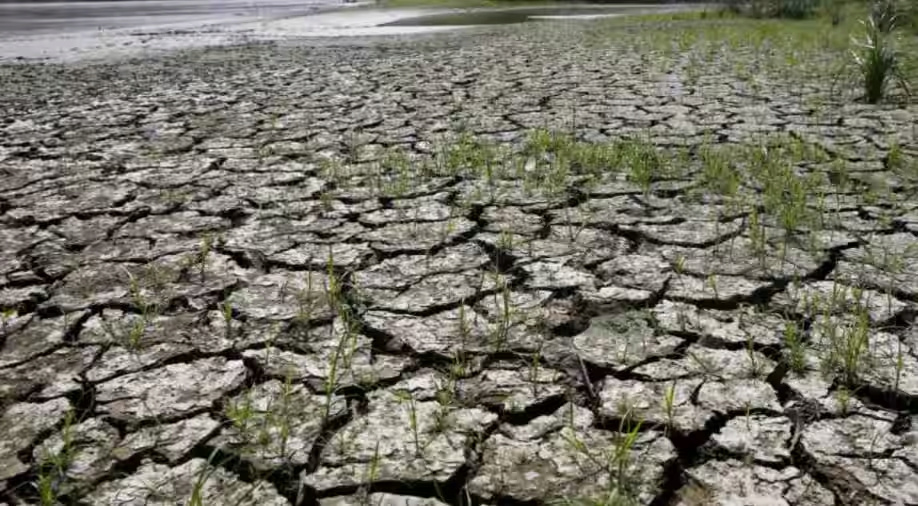Study: A new “supercontinent” may wipe out humans and make the Earth uninhabitable

The image shows the average temperature of the warmest month (in °C) for Earth and the projected supercontinent, Pangea Ultima, within 250 million years.
The formation of a new 'supercontinent' could wipe out humans and all other mammals still alive within 250 million years, researchers predict.

Using the first supercomputer-generated climate models of the far future, scientists from the University of Bristol in the United Kingdom predicted how extreme climate events would intensify after the world's continents merged to form a single supercontinent, Pangea Ultima, in about 250 million years.
Scientists found that the atmosphere would be too hot, too dry, and almost uninhabitable for humans and mammals that have not evolved to handle exposure to extreme heat for long periods.
The researchers simulated trends in temperatures, winds, precipitation, and humidity across the supercontinent, and used models of plate tectonics, chemical oceanography, and biology to calculate carbon dioxide levels.

They found that the formation of Pangea Ultima would not only lead to more regular volcanic eruptions, which could release carbon dioxide into the atmosphere and raise the temperature of the planet, but the sun would become brighter, releasing more energy, and this would lead to a rise in the temperature of the planet. the earth more, As experts pointed out in the study published Monday in the journal “Nature Geoscience.”
“The newly emerging supercontinent will effectively create a triple whammy that includes the effect of continental creep, a hotter sun, and (the release of) more carbon dioxide,” Alexander Farnsworth, lead researcher at the University of Bristol and lead author of the paper, said in a statement Monday. in the atmosphere."
Farnsworth added: “Wide-ranging temperatures, ranging from 40 to 50 degrees Celsius, and even extreme daily temperatures, combined with high levels of humidity, will ultimately determine our fate. Humans, along with many other species, will die because they are unable to They get rid of this heat through sweat, which cools their bodies.

This image shows the geography of the Earth today, and the expected geography of it in 250 million years, when all the continents will converge to form one huge continent.
Farnsworth pointed out that increasing temperatures will create an environment devoid of food or water sources for mammals.
Although there are great uncertainties when making predictions for the distant future, scientists pointed out that the picture looks "very bleak", with only between 8% and 16% of the territory remaining habitable for mammals on the supercontinent.

Carbon dioxide could reach twice its current levels, according to the report, but this calculation was made assuming that humans will stop burning fossil fuels by now, said Benjamin Mills, professor of Earth systems evolution at the University of Leeds and co-author of the report, in a statement. “Otherwise, we would see these numbers much sooner.”
The report's authors warn that this bleak outlook is no excuse for inaction when it comes to tackling today's climate crisis, as human-caused climate change is already killing millions around the world every year.
“We expect the planet to become uninhabitable after 250 million years,” co-author and research fellow in climate change and health at the University of Bristol, Eunice Lu, said in a statement. However, today we are already witnessing extreme heat that is harmful to human health. For this reason, it is extremely important to reach net zero emissions as soon as possible.”
Climate change is transforming life on Earth, with billions of people and other species set to reach a point where they will no longer be able to adapt unless global warming is significantly slowed, according to a UN-backed report published last year.
Source: websites

